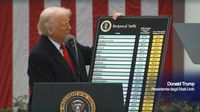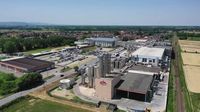As the global economy grapples with the ramifications of President Donald Trump's aggressive tariff policies, the agricultural sector in Turin, including the Susa Valley, is feeling the heat. On April 7, 2025, Bruno Mecca Cici, the president of Coldiretti Torino, voiced concerns about how these tariffs threaten the livelihoods of local producers, particularly in the wine industry. "In recent years, a good portion of our producers has learned to internationalize," Cici explained, noting that many have adapted their strategies to focus on exports and online sales. The American market, in particular, has absorbed a significant share of these exports, with over 30 percent of Turin's DOCG wines being shipped to the United States.
However, the uncertainty surrounding the tariffs has left many small and medium-sized enterprises (SMEs) in a precarious position. Giovanni Genovesio, president of Cna Piemonte, emphasized, "The situation is grave and the concern has never been higher. It feels like a return to the markets of the 1980s, where a protectionist policy could lead to global commercial isolation. Not only will the countries facing the tariffs be affected, but the United States itself will also experience economic repercussions. SMEs, already struggling for years, now face a new threat that could jeopardize their survival."
As the new tariffs take effect, the impact on Italy's economy is expected to be profound. On April 8, Francesco Sgherza, president of Confartigianato Imprese Puglia, warned of a potential economic earthquake for Europe due to these policies. He noted that the new tariffs could decrease Italian exports to the United States by over 11 billion euros, a significant drop from the current 64.8 billion euros. Sgherza pointed out that while regions like Lombardy, Veneto, Emilia Romagna, and Tuscany would bear the brunt of the impact, Puglia is also at risk, exporting goods worth 928.7 million euros to the United States annually.
The most affected sectors include machinery and appliances, means of transport, food and wine, and other manufactured products. Sgherza cautioned that an increase in prices to offset the tariffs might lead consumers to reduce or eliminate their purchases, creating a domino effect throughout supply chains. "What puts companies in the most difficult position is operational instability. We hope that European negotiations will help moderate the tariffs, but nothing assures us that these tariffs won’t be raised further without warning," he said.
Luca Montagnin, president of Cna Padova and Rovigo, also expressed deep concern over Trump's protectionist policies. He stated that many artisan businesses are embedded in international supply chains and will be adversely affected by the tariffs. Montagnin remarked, "The inevitable recession projected on both sides of the Atlantic will reduce internal consumption, income, and the spending capacity of citizens. This will further exacerbate the challenges our SMEs face in the medium term." He urged European institutions and the Italian government to provide support to the local economy.
In a related development, Lactalis Italia, a major player in the cheese market, reported that the USA is a key market, accounting for 6 percent of its total cheese exports and 10 percent of its Parmigiano Reggiano. Starting on April 7, 2025, hard cheeses will be subject to a total duty of 35 percent, which includes an additional 20 percent on top of the existing tariff. This increase poses a significant threat to the competitiveness of Italian products. Mauro Frantellizzi, director of Lactalis Italia Export, highlighted the potential for increased consumer prices, which could hinder sales and growth.
On the political front, the European Union is preparing to respond to Trump's tariffs, with a list of products slated for release on April 15, 2025. Lombardy, Emilia Romagna, and Veneto are expected to suffer the most from these tariffs, according to ministerial estimates. President Fontana warned of potential indirect repercussions on events such as the Olympics, while Mayor Sala expressed concern among exporters and suggested a retaliatory tariff approach.
In the face of these challenges, some producers are advocating for a diplomatic approach. Al Bano Carrisi, a well-known singer and wine producer, commented that Italian Prime Minister Giorgia Meloni is handling the situation well by promoting dialogue with the United States. "The only possible way is dialogue because violence only begets violence," he said. Al Bano exports some of his wine to the United States and remains optimistic that the situation is temporary and resolvable.
Echoing this sentiment, Ettore Prandini, president of Coldiretti, emphasized the importance of maintaining calm and using diplomacy in response to the tariffs. He warned that a tit-for-tat tariff strategy would lead to increased costs for European citizens, which they have managed to avoid thus far. "We are working to ensure that tariffs are eliminated on both sides," he stated.
The future remains uncertain as European leaders work to navigate the complexities of international trade amidst rising tensions. With the stakes high for both local producers and the broader economy, the need for a balanced and strategic response has never been more critical. The agricultural sector, particularly in regions like Turin and Puglia, is poised to face significant challenges, but with strategic focus on emerging markets and diplomatic engagement, there may still be pathways to navigate these turbulent waters.








